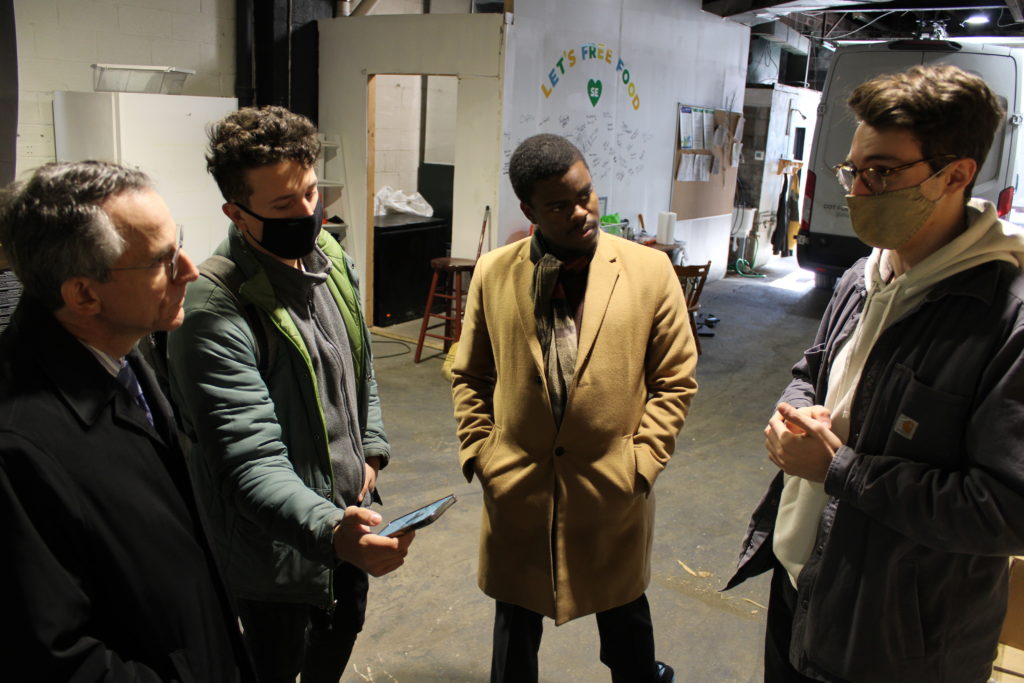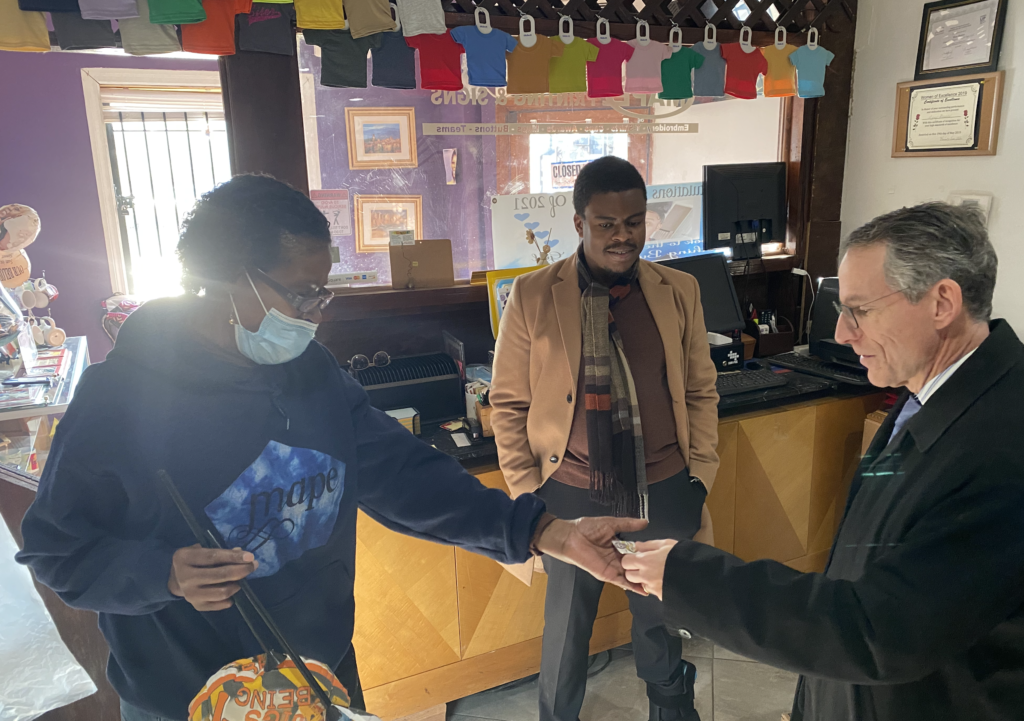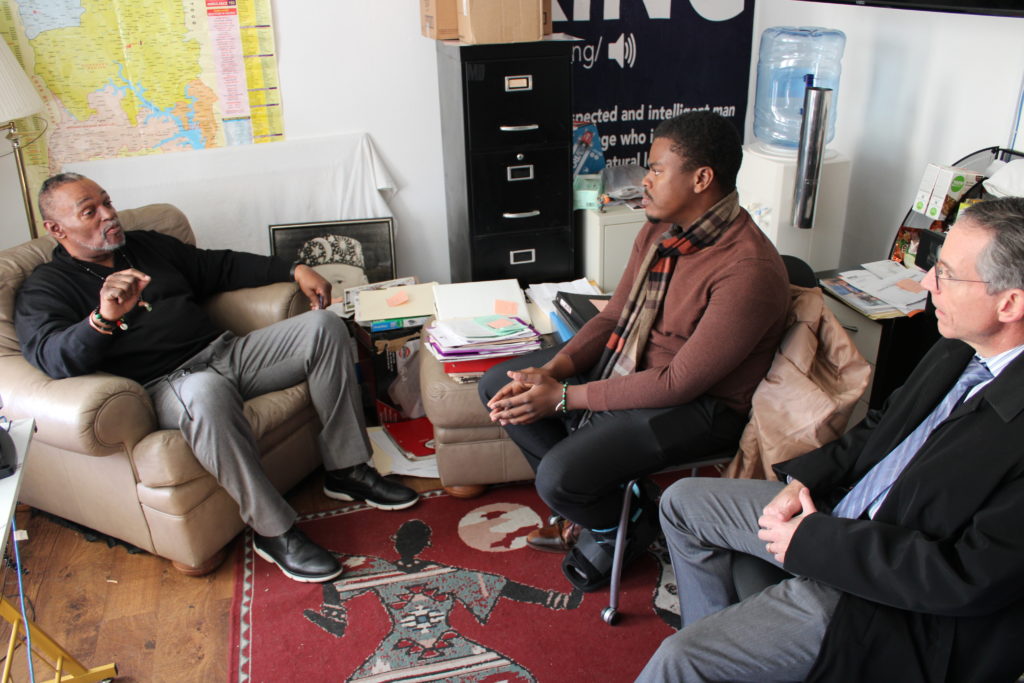A Republican heads to West Philly
It is not exactly profound to say the Republican nomination for governor won’t be won in West Philadelphia. Everyone knows that. Guy Ciarrocchi certainly knows that.
Yet West Philly is where Ciarrocchi, a Republican candidate for governor and the CEO of the Chester County Chamber of Business and Industry, spent an entire afternoon of his campaign in early January, just days after appearing on the debate stage with twelve other candidates.
“When it comes to politics, West Philly has the same problem as Tioga County: after the election, the politicians go away. In both places [the citizens] think, ‘You won’t care,'” Ciarrocchi said. “As the races get run on extreme ideology, nobody talks about problems and plans.”
Driving down Lansdowne Avenue, Ciarrocchi made those remarks to Jabari Jones, president of the West Philadelphia Corridor Collaborative, who organized the listening tour.
“My House District that I live in is 190,” Jones replied to Ciarrocchi. “And before the current representative gave people some hope, the four predecessors have been indicted. For the people that live in that district, they’re like, ‘Why am I coming out to vote anymore? Whoever gets elected is going to go up there, and ten months later they were going to be in jail for selling me out someplace.’”
“It’s the old joke — they were supposed to do good. But instead, they did well,” Ciarrocchi quipped.
Despite the obvious divergence in philosophies between a GOP gubernatorial candidate and the general voting populace of West Philly, the afternoon was crammed with productive dialogue in which ideologies were set aside, and talk about managing the everyday mechanics of business, government, crime, and community dominated.
1:30 PM — Sharing Excess nonprofit food bank
From the outside, the little brick warehouse in the 5100 block of Warren St. looks like the iconic American muffler or transmission auto repair shop. Instead, the brightly lit inside reveals pallets of food, “rescued” before it was discarded.
“We partner with grocery stores, restaurants, wholesalers, farmers. We capture any of their unsold produce and then we give it out to community-based organizations, nonprofits, and they distribute that food to anyone and everyone. But it is intentionally to combat food insecurity,” explained Sharing Excess founder Evan Ellers.

Ellers carefully walked Ciarrocchi and Jones through how the organization has grown and already rescued six million pounds of food while serving 49 zip codes, most of them in West Philly.
“One of the things about running for governor is finding things that work, and promoting them,” Ciarrocchi told Ehlers at the end of the tour. “It may not have a government component, but a sort of bully-pulpit component of ‘This is someone you should be aware of, someone that’s making a difference.’ And it’s not necessarily Senate Bill 12 that will do this,” he said
(Sharing Excess asked to note that it is apolitical and is not endorsing any candidate or party in any race.)
2:15 PM — MAPE Printing and Signs, Lancaster Ave.
Mary Barnes is president and owner of MAPE printing and signs on Lancaster Ave, in business for over twenty years.
Promotional products and more…all in one store.
While it’s still very much a family business, Barnes laughed when explaining that her children stopped working for her because they found better pay at other jobs.
But Barnes, Ciarrocchi, and Jones got serious when it came to talking about why small businesses like hers sometimes do — but more often don’t — get government contracts.

“My experience has been that the process to participate is more onerous than putting in a proposal,” Ciarrocchi said. “In other words, the process of getting into the ‘system’ of being certified to be eligible [as a minority-certified business] is actually harder than bidding on a project.
“And so what happens is, the small business — there’s no incentive to do it,” he continued. “What happens is the bigger companies do it, so it becomes self-perpetuating,” for larger businesses.
Barnes nodded.
“A lot of it is paperwork, you know, getting the proper paperwork to the proper people, the right people,” adding that she was squeezed for time already.
Jones tied the conversation together by noting his chamber was working to strengthen ties with local lawmakers as well as the Department of General Services on government contracting issues.
3:15 PM — Revolutionary Vision Community Service Center
Atiba Kwesi’s office is peppered with “Black Power” signs and maps of Africa, yet he stood political stereotypes on their head by starting off the meeting by telling Ciarrocchi he’s a Republican.
“I catch a lot of rips, but I give it right back to ‘em,” Kwesi said. “They keep telling me ‘Oh, the Republicans’ … but I say, the Republicans aren’t responsible for what’s been happening in Philly. So who’s responsible for that?”
“Next time I get a hard time, I’m calling you,” Ciarrocchi retorted.
Kwesi’s community center dabbles in several efforts such as maintaining a food pantry and organizing coat drives. But nothing features as prominently as Kwesi’s passion for criminal justice work, something that involves working with the current spike in gun crimes and homicides, but also parole and sentencing management.
“They had three shootings here inside of two months, in [2019]. They had one shooting in ‘20, and that’s when we started a moratorium, we started a neutral zone. We haven’t had a shooting, no one has been shot on this block,” since the shootings in 2020.

“We also have an alternative sentencing program here. I wrote a letter for someone that I know, for her son. I sent it to the public defender’s office, they submitted it to the judge, the judge contacted us, and we came up with a program,” Kwesi continued.
“I’ve had twelve people come through this program already and I haven’t received a dime. We don’t get any grants from any of the politicians around here, because I’m a Republican and they’re Democrats,” he said.
After more conversation on the programs at Revolutionary Vision, the conversation turned back to crime.
“The Krasner thing … [the city council] could tell him what to do. Kenney doesn’t want to fight with him, city council doesn’t want to fight with him. But nobody’s getting shot in Larry Krasner’s neighborhood,” Ciarrocchi said.
Issues like crime and corruption cut across party, race, and class. In neighborhoods like West Philadelphia, too often ignored by one party and taken for granted by the other, it is rare for a politician to show his face. In this respect, Ciarrocchi stands out from a crowded Republican field.
Editor’s note: Because of time constraints, Broad + Liberty has not attempted to verify any of the factual claims in this conversation.
Todd Shepherd is Broad + Liberty’s chief investigative reporter. Send him tips at tshepherd@broadandliberty.com, or use his encrypted email at shepherdreports@protonmail.com.




It’s a start – politicians on both sides have to go out of their ways to go and actually listen to “typical” voter who’s assumed to be a vote for the other side. Too often we are only treated to the concurrent monologues of the talking heads on TV.